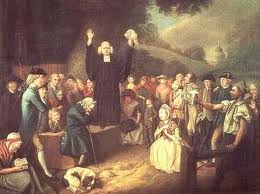
Jonathan Edwards once said, “I assert that nothing comes to pass without a cause.” That indeed was true of the American Revolution. What things caused the Revolutionary War? Interestingly enough, a movement that Jonathan Edwards was a part of can be credited with many of the seeds of our liberty. English statesman, William Knox, said this about the affects of the First Great Awakening, “Every man being thus allowed to be his own pope, he becomes disposed to be his own king.”
That pretty much sums up the affects that the First Great Awakening had on Colonial America.
The First Great Awakening was a revival of the Christian church during the early decades of the 1700s. The two most prominent leaders of the revival were Jonathan Edwards, a quiet New England preacher and George Whitfield, one of the greatest evangelists in history.
Nothing, as Edwards noted, is without a cause. The First Great Awakening was caused by lackluster religious commitment and general dissatisfaction with the current state of the church. At the time, two churches dominated the Colonies: the Puritan and Anglican.
Through the early decades of the eighteenth century religious fervor increased as preachers rallied from the pulpit to encourage religious devotion. Thousands of people came to Christ and denominations began to form.
The result? Unity among the Colonies, a hungering after God and a national identity. The revival did so much to cause the American Revolution that the war was called the Presbyterian Rebellion in England. Revivalist preachers significantly influenced the founding fathers, sometimes personally. Patrick Henry was personally influenced by the oratory style and the message of revivalist preacher, Samuel Davies.
Today, the church in America is in desperate need of revival. Let us rest assured in the hope, that the God who used a revival to begin our great nation is powerful enough to use another one to preserve and sustain it.
